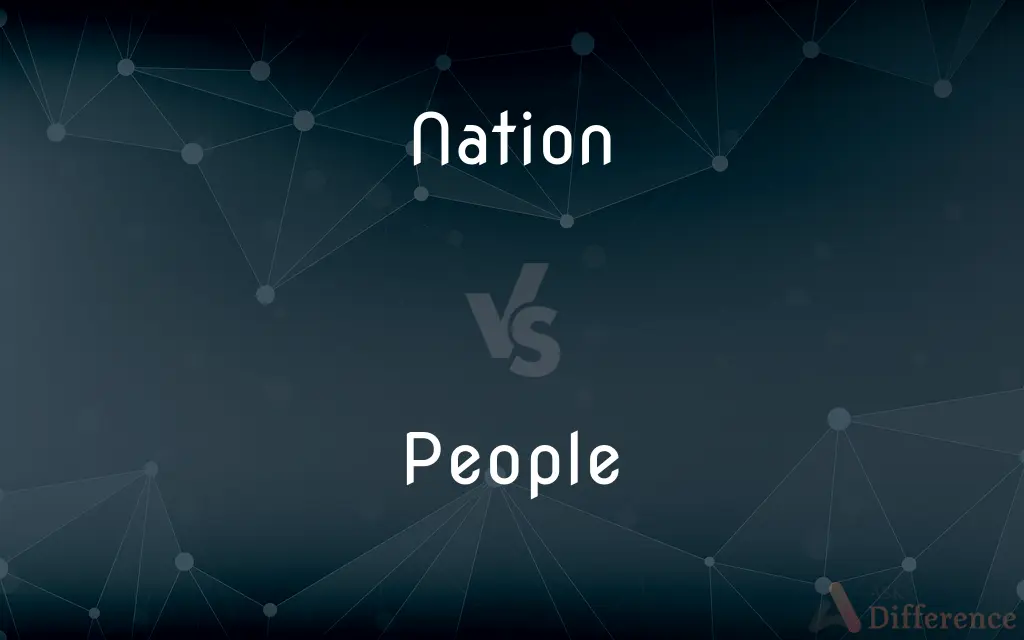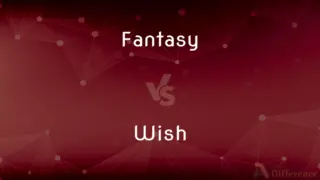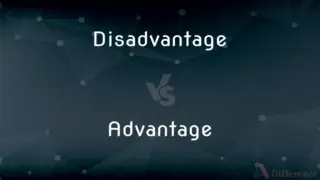Nation vs. People — What's the Difference?
By Maham Liaqat & Urooj Arif — Updated on March 18, 2024
A nation is a large group united by common cultural elements and history, whereas people refers to any group of individuals, often within a nation, sharing specific characteristics.

Difference Between Nation and People
Table of Contents
ADVERTISEMENT
Key Differences
A nation embodies a collective identity shaped by shared history, culture, language, and often a common territory. People, in contrast, can refer to groups within a nation or across nations, united by ethnicity, language, or other social ties.
Nations are political entities recognized within specific geographical boundaries, with governance and sovereignty. People, however, may not necessarily align with political boundaries and can transcend nations, focusing more on shared heritage or beliefs.
The concept of a nation often implies a sense of shared governance and political aspirations, emphasizing unity and collective identity. People, while integral to forming a nation, can denote a more diverse and fluid grouping, not limited by political or territorial constraints.
Nations strive for political autonomy and are recognized in international law and diplomacy. The term "people" emphasizes social and cultural connections, which can exist without formal political recognition or autonomy.
While a nation's identity is often formalized through statehood and governance, the identity of people is more about shared experiences, traditions, and values, which might not be officially recognized but are culturally significant.
ADVERTISEMENT
Comparison Chart
Definition
A large group with common culture, history, and territory
Any group of individuals sharing specific characteristics
Political Entity
Yes, with recognized sovereignty
No, transcends political boundaries
Scope
Geographical and political unity
Social, ethnic, or cultural unity
Identity
Formalized through statehood and governance
Defined by shared experiences, traditions, values
International Recognition
Recognized in international law and diplomacy
May exist without formal political recognition
Compare with Definitions
Nation
A large aggregate of people united by common descent, history, culture, or language, inhabiting a particular country or territory.
The Cherokee Nation has a rich history and vibrant culture.
People
A large aggregate of people united by common descent, history, culture, or language, inhabiting a particular country or territory.
The Cherokee Nation has a rich history and vibrant culture.
Nation
A community with a collective identity and shared governance aspirations.
The Kurdish nation seeks greater autonomy.
People
A community with a collective identity and shared governance aspirations.
The Kurdish nation seeks greater autonomy.
Nation
Symbolizes unity and collective identity.
The Olympic Games bring together athletes from nations around the world.
People
Symbolizes unity and collective identity.
The Olympic Games bring together athletes from nations around the world.
Nation
A political and territorial entity with borders.
France is a nation known for its influence on art and culture.
People
An entity recognized by international law, having sovereignty and governance.
Each nation at the United Nations has a vote.
Nation
An entity recognized by international law, having sovereignty and governance.
Each nation at the United Nations has a vote.
People
A political and territorial entity with borders.
France is a nation known for its influence on art and culture.
Nation
A nation is a community of people formed on the basis of a common language, history, ethnicity, a common culture and, in many cases, a shared territory. A nation is a collective identity of people.
People
A people is a plurality of persons considered as a whole, as is the case with an ethnic group, nation or the public of a polity.
Nation
A relatively large group of people organized under a single, usually independent government; a country.
People
The members of a particular nation, community, or ethnic group
The native peoples of Canada
Nation
The territory occupied by such a group of people
All across the nation, people are voting their representatives out.
People
The supporters or employees of a person in a position of power or authority
I've had my people watching the house for some time now
Nation
The government of a sovereign state.
People
(of a group of people) inhabit (a place)
An arid mountain region peopled by warring clans
Nation
A people who share common customs, origins, history, and frequently language; a nationality
"Historically the Ukrainians are an ancient nation which has persisted and survived through terrible calamity" (Robert Conquest).
People
Humans considered as a group or in indefinite numbers. Often treated as a plural of person, alone and in compounds
People were dancing in the street. I met all sorts of people. This book is not intended for laypeople.
Nation
A federation or tribe, especially one composed of Native Americans.
People
The mass of ordinary persons; the populace. Used with the
"those who fear and distrust the people, and wish to draw all powers from them into the hands of the higher classes" (Thomas Jefferson).
Nation
The territory occupied by such a federation or tribe.
People
A body of persons living in the same country under one national government; a nationality.
Nation
A historically constituted, stable community of people, formed based on a common language, territory, economic life, ethnicity and/or psychological make-up manifested in a common culture.
The Roma are a nation without a country.
People
The citizens of a political unit, such as a nation or state; the electorate. Used with the.
Nation
A sovereign state.
Though legally single nations, many states comprise several distinct cultural or ethnic groups.
People
Pl. peo·ples A body of persons sharing a common religion, culture, or language
The peoples of central Asia.
Nation
An association of students based on its members' birthplace or ethnicity.
Once widespread across Europe in medieval times, nations are now largely restricted to the ancient universities of Sweden and Finland.
People
Persons with regard to their residence, class, profession, or group
City people.
Farming people.
Nation
(obsolete) A great number; a great deal.
People
Persons subordinate to or loyal to a ruler, superior, or employer
The manager would like to introduce you to our people in the regional office.
Nation
(rare) Damnation.
People
A person's family, relatives, or ancestors
Where are your people from?.
Nation
Extremely, very.
People
(Informal) Animals or other beings distinct from humans
Rabbits and squirrels are the furry little people of the woods.
Nation
A part, or division, of the people of the earth, distinguished from the rest by common descent, language, or institutions; a race; a stock.
All nations, and kindreds, and people, and tongues.
People
To settle or inhabit with people; populate.
Nation
The body of inhabitants of a country, united under an independent government of their own.
A nation is the unity of a people.
Praise the power that hath made and preserved us a nation.
People
To be present in or on (a place)
"The stores ... are peopled by serious shoppers" (Perri Klass).
Nation
Family; lineage.
People
Used as plural of person; a body of human beings considered generally or collectively; a group of two or more persons.
There were so many people at the restaurant last night.
Nation
One of the divisions of university students in a classification according to nativity, formerly common in Europe.
People
(countable) Persons forming or belonging to a particular group, such as a nation, class, ethnic group, country, family, etc.
Nation
A great number; a great deal; - by way of emphasis; as, a nation of herbs.
People
A group of persons regarded as being employees, followers, companions or subjects of a ruler.
Nation
A politically organized body of people under a single government;
The state has elected a new president
African nations
Students who had come to the nation's capitol
The country's largest manufacturer
An industrialized land
People
One's colleagues or employees.
Nation
The people who live in a nation or country;
A statement that sums up the nation's mood
The news was announced to the nation
The whole country worshipped him
People
A person's ancestors, relatives or family.
My people lived through the Black Plague and the Thirty Years War.
Nation
A federation of tribes (especially native American tribes);
The Shawnee nation
People
The mass of a community as distinguished from a special class (elite); the commonalty; the populace; the vulgar; the common crowd; the citizens.
Nation
United States prohibitionist who raided saloons and destroyed bottles of liquor with a hatchet (1846-1911)
People
Plural of person.
People
(transitive) To stock with people or inhabitants; to fill as with people; to populate.
People
(intransitive) To become populous or populated.
People
(transitive) To inhabit; to occupy; to populate.
People
To interact with people; to socialize.
People
The body of persons who compose a community, tribe, nation, or race; an aggregate of individuals forming a whole; a community; a nation.
Unto him shall the gathering of the people be.
The ants are a people not strong.
Before many peoples, and nations, and tongues.
Earth's monarchs are her peoples.
A government of all the people, by all the people, for all the people.
People
Persons, generally; an indefinite number of men and women; folks; population, or part of population; as, country people; - sometimes used as an indefinite subject or verb, like on in French, and man in German; as, people in adversity.
People were tempted to lend by great premiums.
People have lived twenty-four days upon nothing but water.
People
The mass of community as distinguished from a special class; the commonalty; the populace; the vulgar; the common crowd; as, nobles and people.
And strive to gain his pardon from the people.
People
One's ancestors or family; kindred; relations; as, my people were English.
People
To stock with people or inhabitants; to fill as with people; to populate.
As the gay motes that people the sunbeams.
People
(plural) any group of human beings (men or women or children) collectively;
Old people
There were at least 200 people in the audience
People
The body of citizens of a state or country;
The Spanish people
People
The common people generally;
Separate the warriors from the mass
Power to the people
People
Members of a family line;
His people have been farmers for generations
Are your people still alive?
People
Fill with people or supply with inhabitants;
People a room
The government wanted to populate the remote area of the country
People
Make one's home or live in;
She resides officially in Iceland
I live in a 200-year old house
These people inhabited all the islands that are now deserted
The plains are sparsely populated
Common Curiosities
How do people contribute to the concept of a nation?
People form the basis of a nation through shared language, culture, history, and aspirations, contributing to the nation's collective identity and social cohesion.
Can a nation exist without a state?
Yes, the term nation can refer to a cultural and ethnic community seeking self-determination, even if it does not have its own sovereign state.
Are the terms 'nation' and 'country' interchangeable?
While often used interchangeably in casual conversation, 'nation' emphasizes cultural and historical aspects, whereas 'country' refers to a geographical territory with a governing authority.
Is nationality the same as ethnicity?
Not necessarily; nationality refers to belonging to a specific nation, often linked to citizenship, while ethnicity is about shared cultural or ancestral traits, which can transcend national boundaries.
How do international laws protect people without a nation?
International laws and conventions aim to protect stateless people and minorities by upholding human rights, preventing discrimination, and ensuring access to legal protections.
Can people belong to multiple nations?
Yes, individuals can identify with multiple nations, especially in cases of dual heritage or when living in a multicultural society.
xWhat is the main difference between a nation and people?
A nation is a politically and territorially defined entity with a collective identity, while people refer to a group of individuals often characterized by shared cultural, ethnic, or social traits, not necessarily confined to a nation.
What impact does globalization have on nations and people?
Globalization can blur traditional boundaries, influencing how nations and people interact, share cultures, and perceive identities in an increasingly connected world.
How do nations preserve their cultural identity?
Nations preserve cultural identity through education, celebrating traditions and history, language preservation, and legal protections for cultural heritage.
What is the role of language in defining a nation and people?
Language plays a crucial role in defining both a nation and its people by facilitating communication, preserving culture, and fostering a sense of identity and unity.
What roles do nations play in international relations?
Nations act as sovereign entities in international relations, participating in diplomacy, trade, and global governance through recognized states.
How do people without a recognized nation seek recognition?
People from unrecognized nations may seek international recognition through diplomacy, advocacy, and participation in international forums that address indigenous and minority rights.
Can the concept of people change over time?
Yes, the concept of people can evolve with societal changes, migration, and the blending of cultures, affecting identity and group affiliations.
What is the significance of people's movements in political contexts?
People's movements can influence political change, advocate for rights and autonomy, and impact national and international policies through collective action.
How do migration patterns affect the concepts of nation and people?
Migration can lead to the diversification of societies, the formation of diaspora communities, and the redefinition of national and people's identities, reflecting the dynamic nature of cultural exchange and adaptation.
Share Your Discovery

Previous Comparison
Fantasy vs. Wish
Next Comparison
Disadvantage vs. AdvantageAuthor Spotlight
Written by
Maham LiaqatCo-written by
Urooj ArifUrooj is a skilled content writer at Ask Difference, known for her exceptional ability to simplify complex topics into engaging and informative content. With a passion for research and a flair for clear, concise writing, she consistently delivers articles that resonate with our diverse audience.
















































